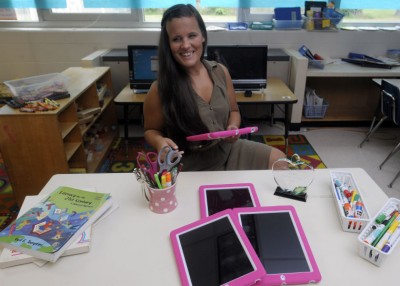
Students in Mary Almeida’s first-grade class at Hazardville Memorial School in Enfield use iPads to practice spelling, create digital stories, submit subtraction quizzes and follow QR code-driven scavenger hunts. They also locate and use live texts and, through an app called ClassDojo, Almeida provides parents with real-time updates on their child’s behavior.
While some may find this use of technology surprising, to Almeida it only makes sense: “Exposure to technology is happening in more and more homes prior to children even entering school. By positioning it as a learning tool, and not just a gaming device, students are provided with resources and practice that extend beyond the classroom.”
Guiding Almeida’s efforts to use technology to make learning not just rich, but rigorous, are the experienced UConn faculty members overseeing the Neag School of Education’s Two Summers Master’s or Sixth Year program in Learning Technology within the Department of Educational Psychology. As the name suggests, the Two Summers Program takes places over two summers, designed to help working K-12 teachers learn how to wisely and effectively integrate learning technology into classroom instruction.
Participants attend classes at UConn’s Storrs campus for one week during two summers and complete the rest of the coursework online during the Fall and Spring semesters. At the end of the second summer session, as Almeida will do this July, graduating students present a capstone project.
When that occurs, Almeida, who in June was named Enfield Teacher of the Year, will have earned her Sixth Year diploma. She will also be part of a group of like-minded colleagues that, in her words, “I can always turn to.”
Because program cohorts are limited to no more than 20 students who all follow the same course of study, friendships and support systems form as cohort members explore digital literacy and learning strategies, develop research methods, analyze effective instructional design principles and participate in online communities. They also learn how to use technology for the professional development of teachers, as well as about assistive technology available for students across the K-12 spectrum.
Founded in 2006, the program has a more than 90 percent completion rate, said Two Summers Learning Technology Program Director Michael Young, who served as Almeida’s advisor.
“Like many districts, Mary’s works within many technological constraints, yet she’d been able to take what she’s learned in the program, apply for grants and integrate technology in a way that enhances student engagement and learning,” Young said. “And her enthusiasm is infectious. Like many of the teachers in the Two Summers program, she sees the integration of technology as an opportunity for risk taking and creativity in the classroom.”
Part of the Enfield School District’s iPad Consortium, which ensures that every child in Almeida’s class has an iPad to use during the school day, Almeida has used her Learning Technology experience primarily to enrich her first-grade classroom. However, two peers in her cohort have used it to change jobs and become district-level technology coordinators.
Almeida’s classroom is also outfitted with a SmartBoard and Apple TV, and though she has no immediate plans to leave it, it’s exciting, she said, to know that her ongoing education has provided her with more versatility within her career.
“Building a strong foundation and a passion for learning is not only exciting, but something I feel strongly about. The option to have mobility with the degree—either as a coach, teacher or district coordinator—will be a benefit later in my career. I would love to share what I’ve learned about incorporating technology effectively in support of the curriculum. As [Education Professor and John and Maria Endowed Chair in Literacy and Technology Donald] Leu has said and written, no one person will know every new literacy. Collaboration and peer modeling is a key component to being an effective practitioner.”
She also believes in the importance of students being pushed outside their comfort zone, something she knew the Neag School of Education would do for her.
“UConn’s teacher education programs have amazing reputations, and when I came across the Two Summers Program, I knew that it was the perfect fit for me,” Almeida continued. “Course work hasn’t been about mastering the content in the syllabus, but about approaching new situations with a critical eye, creativity and forethought about how it will be effective for my learners in the future. I also found such value in the knowledge my peers brought to discussions. Whether you shared the same vantage point or not, we were able to feed off of one another’s ideas and mold them into something that worked for each of us. I love being a lifelong learner.”
Equally important, she loves to inspire her students to navigate their own learning: “My students are my family. I love that I get to shine light on the amazing things 6- and 7-year-olds can accomplish. Their curiosities fuel and inspire me when creating new learning experiences for them.”
To see a video on Ms. Almedia produced by the Enfield School District, click here.
To learn more about her program, visit the Neag Online Program website.
 Facebook
Facebook
 Twitter
Twitter
 LinkedIn
LinkedIn
